人教新目标(Go for it)版七年级上册Units 4-6知识点复习(在线学习课件)(共56张PPT)
文档属性
| 名称 | 人教新目标(Go for it)版七年级上册Units 4-6知识点复习(在线学习课件)(共56张PPT) | 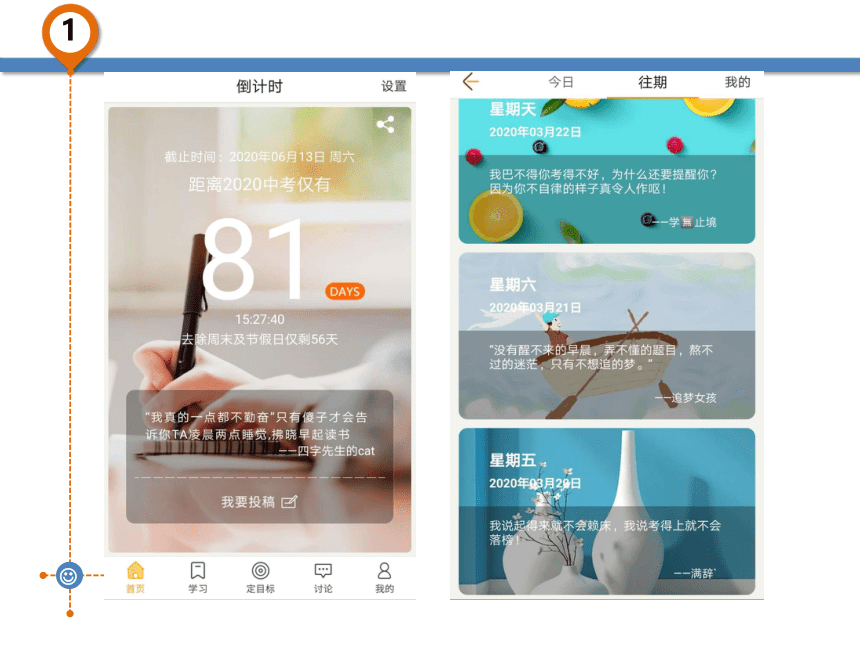 | |
| 格式 | zip | ||
| 文件大小 | 9.5MB | ||
| 资源类型 | 教案 | ||
| 版本资源 | 人教新目标(Go for it)版 | ||
| 科目 | 英语 | ||
| 更新时间 | 2020-03-25 16:04:45 | ||
图片预览


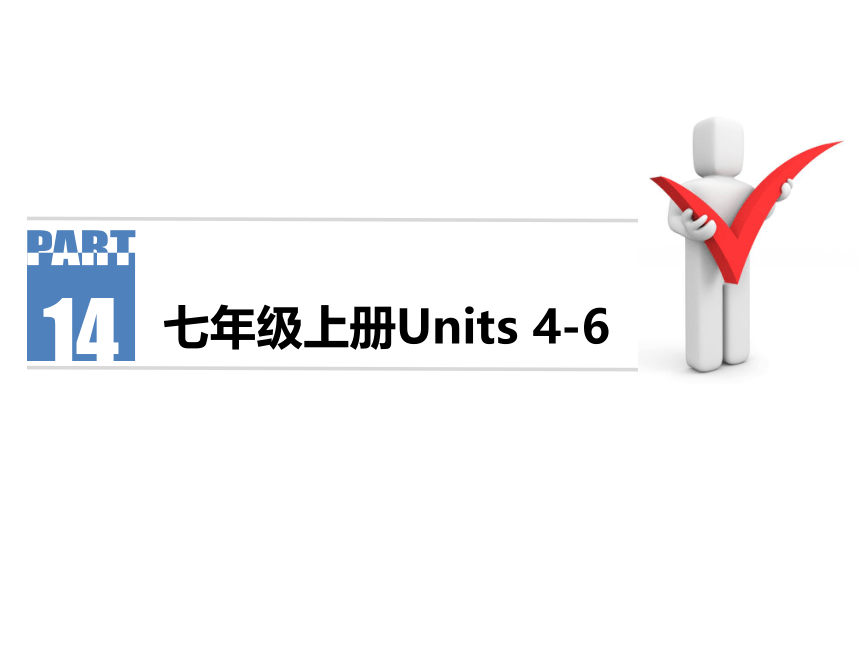
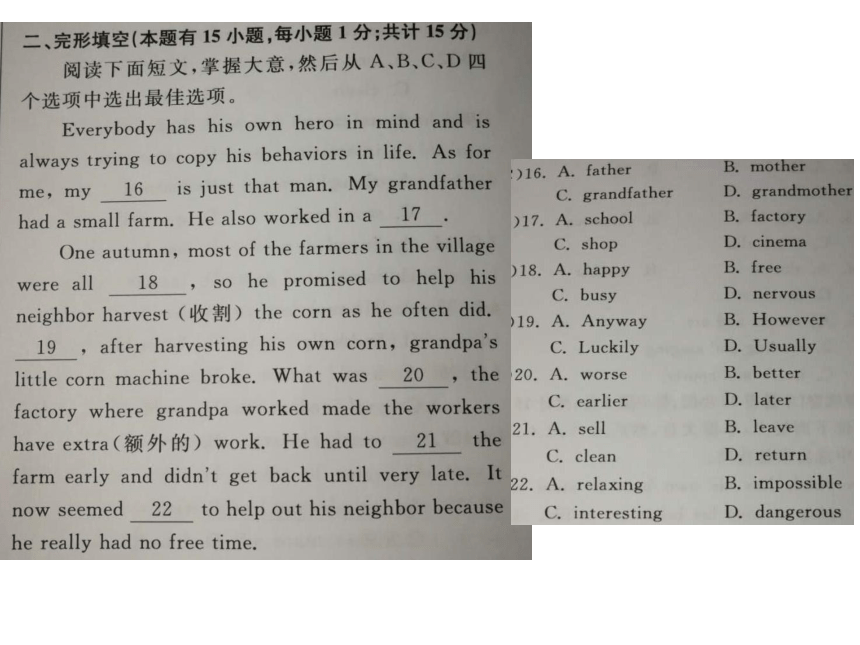
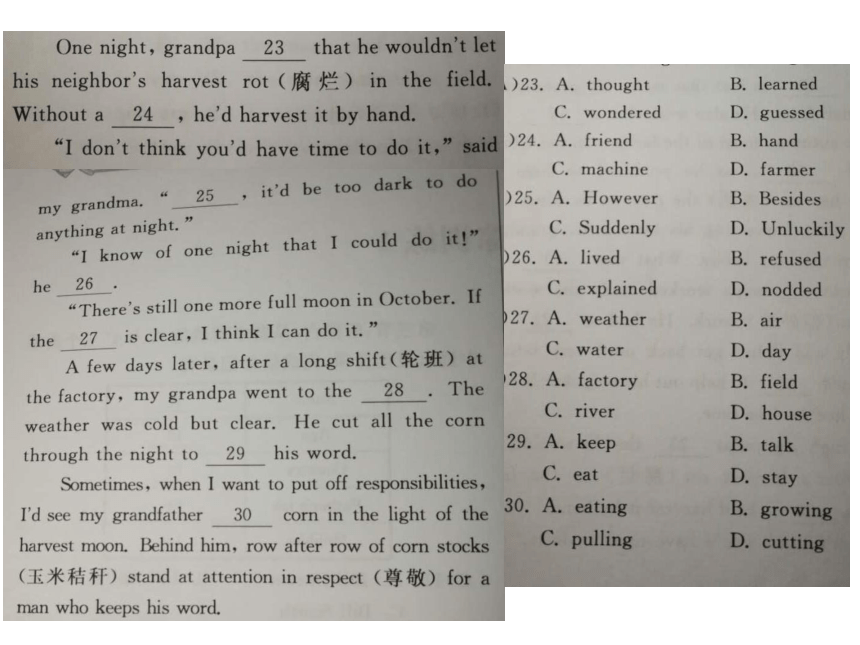
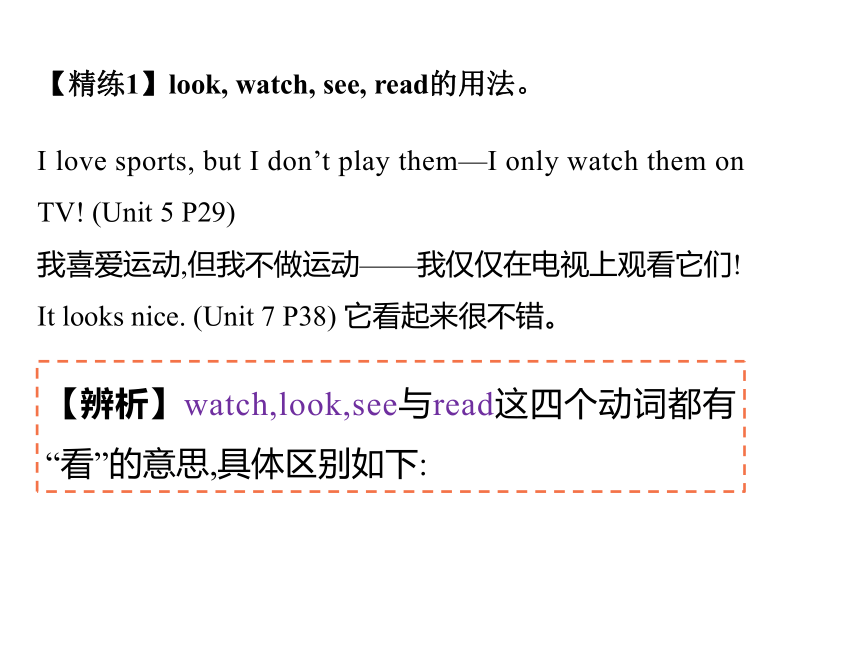
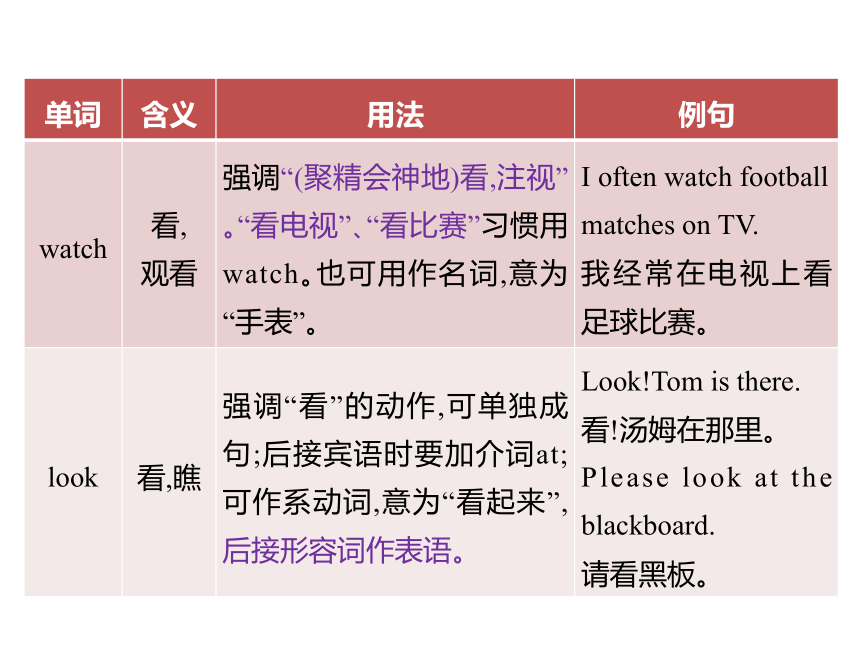
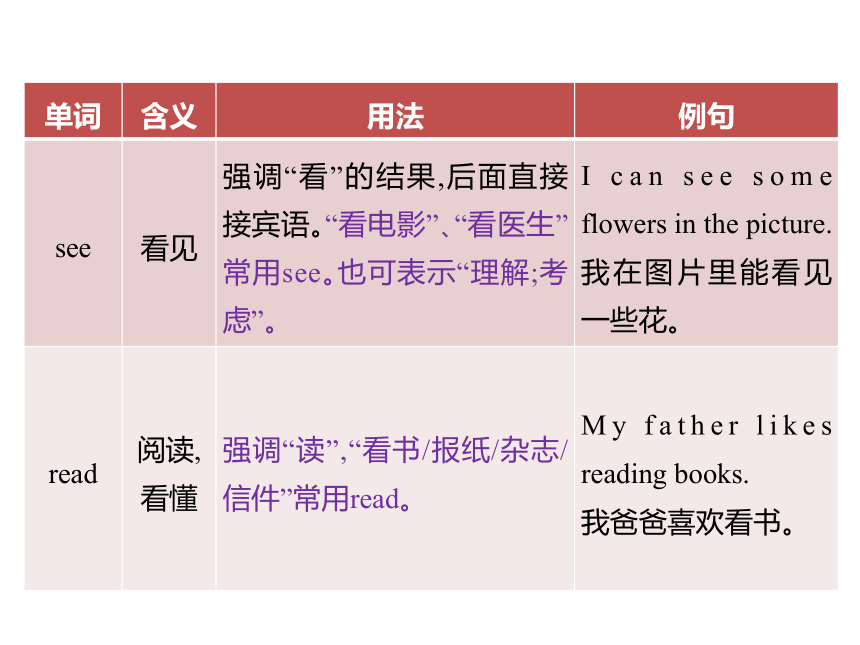
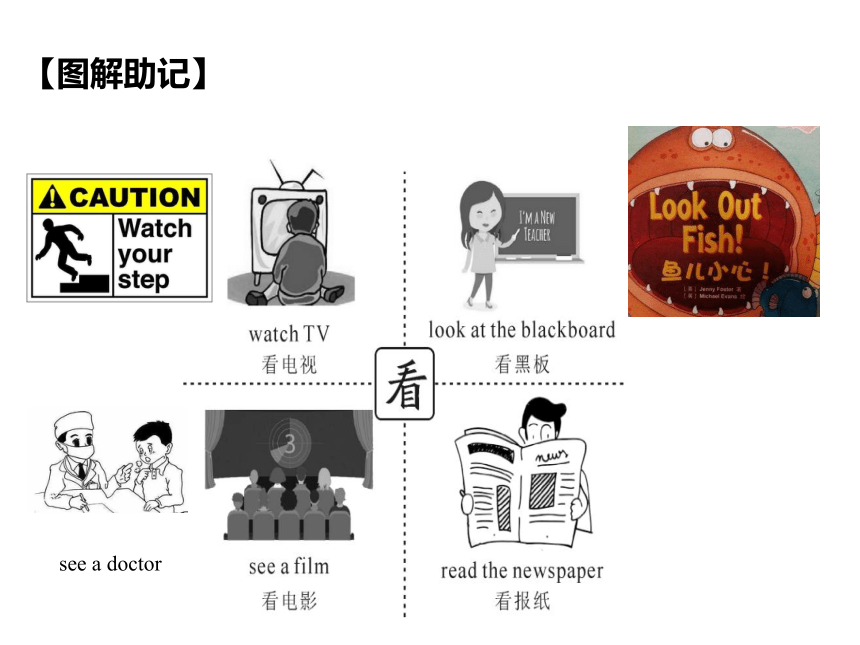
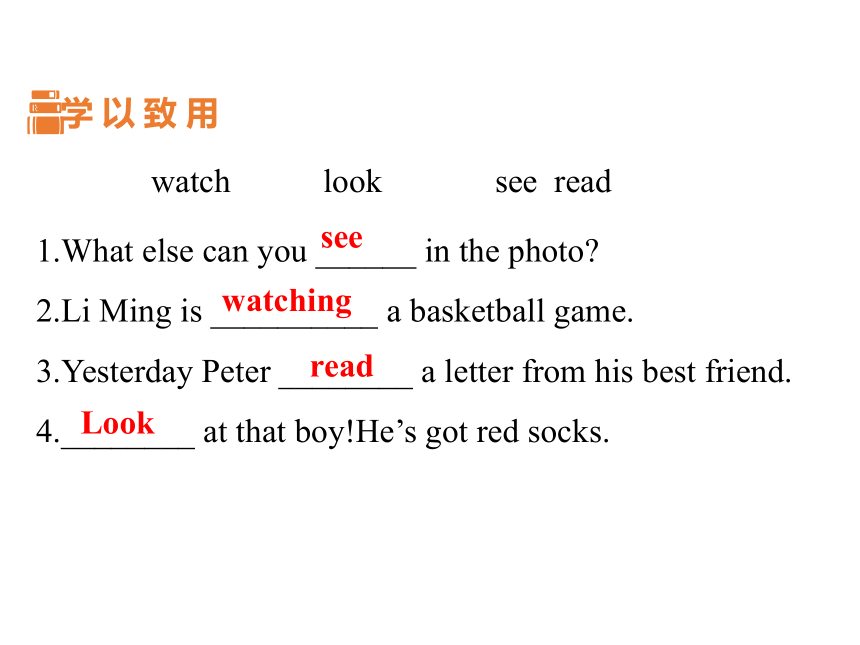
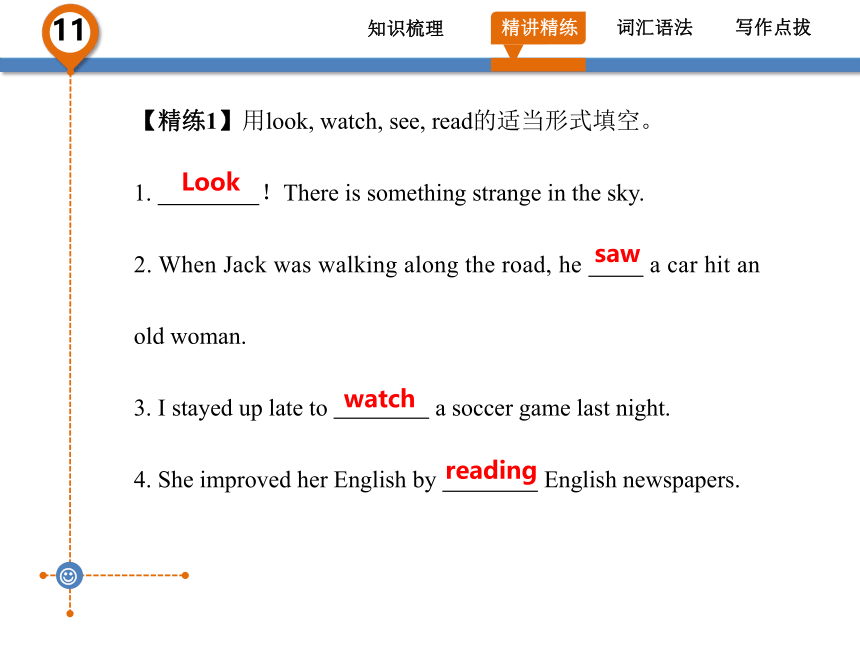
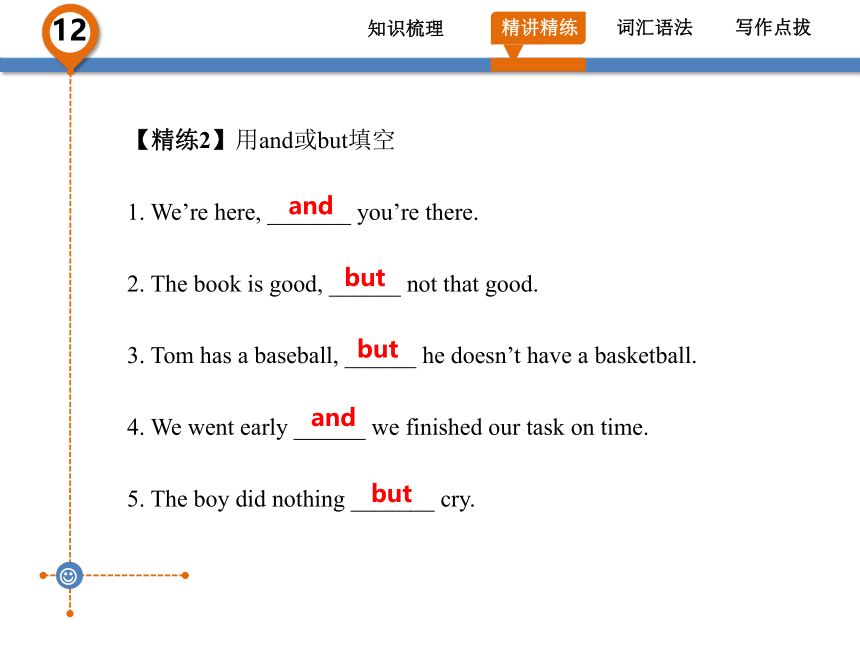
文档简介
(共56张PPT)
2
14
七年级上册Units 4-6
I love sports, but I don’t play them—I only watch them on TV! (Unit 5 P29)
我喜爱运动,但我不做运动——我仅仅在电视上观看它们!
It looks nice. (Unit 7 P38) 它看起来很不错。
【辨析】watch,look,see与read这四个动词都有“看”的意思,具体区别如下:
【精练1】look, watch, see, read的用法。
单词 含义 用法 例句
watch 看,
观看 强调“(聚精会神地)看,注视”?“看电视”?“看比赛”习惯用watch?也可用作名词,意为“手表”? I often watch football matches on TV.
我经常在电视上看足球比赛?
look 看,瞧 强调“看”的动作,可单独成句;后接宾语时要加介词at;可作系动词,意为“看起来”,后接形容词作表语? Look!Tom is there.
看!汤姆在那里?
Please look at the blackboard.
请看黑板?
单词 含义 用法 例句
see 看见 强调“看”的结果,后面直接接宾语?“看电影”?“看医生”常用see?也可表示“理解;考虑”? I can see some flowers in the picture.
我在图片里能看见一些花?
read 阅读,
看懂 强调“读”,“看书/报纸/杂志/信件”常用read? My father likes reading books.
我爸爸喜欢看书?
【图解助记】
see a doctor
学 以 致 用
1.What else can you ______ in the photo?
2.Li Ming is __________ a basketball game.
3.Yesterday Peter ________ a letter from his best friend.
4.________ at that boy!He’s got red socks.
?
watch look see read
see
watching
read
Look
【精练1】用look, watch, see, read的适当形式填空。
1. !There is something strange in the sky.
2. When Jack was walking along the road, he a car hit an old woman.
3. I stayed up late to a soccer game last night.
4. She improved her English by English newspapers.
Look
saw
watch
reading
【精练2】用and或but填空
1. We’re here, _______ you’re there.
2. The book is good, ______ not that good.
3. Tom has a baseball, ______ he doesn’t have a basketball.
4. We went early ______ we finished our task on time.
5. The boy did nothing _______ cry.
and
but
but
and
but
6. Work hard, _______ you will pass the exam.
7. He does it fast ______ well.
8. She missed the bus ______ she had to take the next one.
9. I came not as a teacher, _____ as a student.
10. He was not only a successful writer, ______ the greatest poet of his time.
and
and
and
but
but
在空白处和有中文提示的空白处,填入一个合适的单词;在有英文提示的空白处,用所给单词的适当形式填空。
1. He has a lot of good eating (习惯).
2. Everyone must keep the classroom clean and (整洁的).
3. The (模型)plane is made in France.
4. I like ping-pong. It’s so (容易)for me.
5. After dinner, my father usually (观看)news on TV.
6. The English book is (在……下面)the radio.
7. The boy was very sad and ate nothing for (午餐).
8. There is something wrong with my (时钟).
9. Hurry up!Or we’ ll be (迟到)for class.
habits
tidy
model
easy
watches
under
lunch
clock
late
10. He usually has ________(面包)and milk for breakfast.
11. We should play sports every day to keep (health).
12. We can make the world more beautiful by (we)effort.
13. I think it’s in your (grandparent)room.
14. I like (tomato), and I always eat them.
15. The movie is (bore), so I don’t want to see it again.
16. I love sports, but I don’t play (they).
17. We had some noodles _____ dinner last night.
18. I don’t have a soccer ball, but my cousin ________.
19. Alice likes oranges, ______ she doesn’t like apples.
20. Jim and his brother are in _______ same school.
bread
healthy
our
grandparents'
tomatoes
boring
them
for
does
but
the
【话题】 饮食习惯和健康
佳句参考:
There is a saying—People live on food. From it you can see how important food is.
I like different foods for dinner, especially fish and vegetables. They provide me with energy and keep me healthy.
As for fast food, I don’t like it very much. So I hardly ever eat it.
We should stay away from junk food although it’s delicious. Eating too much of it is harmful to our health.
It’s good for your health to drink water and milk as often as possible.
Make sure you have a healthy diet every day.
教材考点解析
...let’s go!……(让)我们走吧!(Unit 5 P26)
考点一
【点拨】这是个以let开头的祈使句,其中let’s是let us的缩写形式,句型结构为let sb.do sth.,意为“让某人做某事”,用来表示请求或建议?此处的sb.通常为代词宾格,sb.后面跟动词原形?
其肯定回答:OK./All right./That sounds good.
否定回答:Sorry,I.../No, let’s...
[辨析]let’s...与let us...
? 用法 反意疑问句
Let’s... 用于提出建议,表示“咱们做某事吧”,包括对方在内。 shall we
let us... 用于请求他人允许,表示“请让/允许我们做某事”,不包括对方在内。 will you
( )1.Parents should let children home and find more about the world. After all, birds should fly freely in the sky.
?A.leave B.leaves C.leaving
( )2.(2019·怀化)
—It’s a nice day today. Let’s go to the park.
—__________.
A.Good idea B.It doesn’t matter C.Thank you
学 以 致 用
A
A
That sounds good . 听起来很不错。Unit 5 P27)
考点二
sound listen hear
词条 意义 固定搭配
sound 听起来 sound like… 听起来像……
listen 听。强调动作或提醒对方注意 listen to… 听……
hear 听到,听见。强调听的 结果 hear of… 听说……
hear from… 收到……的来信
hear sb. do sth.听见某人做某事(强调过程)
hear sb. doing sth. 听见某人正在做某事
(强调进行)
sound/listen/hear
用sound, listen, hear的适当形式填空。
(1)—Have you ever seen the movie Titanic, Wang Wei?
—Yes. The music in it great.?
(2) ! What's that noise? Can you hear it??
(3)I couldn't what they were saying most of the time.?
sounds
Listen
hear
sound, voice与noise
1. sound 泛指一切自然界的声音。
Peter heard the sound of gunfire. 彼得听见了枪炮声。
At midnight he heard a strange sound.
半夜里他听到一种奇怪的声音。
Light travels much faster than sound.
光的传播速度比声音快得多。
2. voice 指的是一个人唱歌或讲话的嗓音。
Miriam’s voice was strangely calm. (指讲话的声音)
米里亚姆的声音出奇地平静。
The girl has a beautiful voice. (指嗓音)
那女孩嗓音很美。
When the teacher came into the classroom,our monitor
spoke in a loud voice, “Stand up!” (指嗓音)
老师走进教室时,班长大声喊:“起立!”
3. noise 指一些吵闹的,让人觉得不愉快的噪音。
There was too much noise in the room and he needed peace.
房间里有太多噪音了,他需要安静。
Don’t make any noise! 别吵闹!
The noise wakes me up.
噪音吵醒了我!
The noise of traffic kept him awake.
车辆的喧闹声使他睡不着。
用sound, noise或voice的适当形式填空。
(1)Don't make any in the library, children.?
(2) travels slower than light.?
(3)Zhu Zhiwen won a talent show called The Sound because of his excellent and wonderful acting skills.?
(4)The first cartoon film with and music was made in New York in 1928.?
(5)To everyone‘s surprise, their plan similar to ours.?
sounds/sounded
Sound
voice
sound
noise
考点三
It’s on the chair.Let me get it.
它在椅子上?让我(去)拿(它)?(Unit 5 P26)
【辨析】carry, bring, take, fetch与get这五个动词都有“拿;带”的意思,具体区别如下:
单词 含义 用法 例句
carry 搬;扛;
提;拿 可表示“随身携带”;不强调方向性,但有负重之意? Jack can’t carry the box.杰克搬不动这个箱子?
bring 拿来;
带来 把某物(人)从别处带到说话处,常与to连用? Don’t forget to bring your English book here tomorrow.明天别忘了把你的英语书带来?
单词 含义 用法 例句
take 拿走;
带走 把某物(人)从说话处带到别处,常与to连用,与bring方向相反? Take these balls to the classroom,please.请把这些球拿到教室去?
fetch
/get 拿来;
取来 去别处把某物(人)带来,强调动作的往返? Could you fetch me my bag?你能否去把我的包取来?
【图解助记】
学 以 致 用
用carry,bring,take,fetch和get填空?
1.—Excuse me.How can I get to the zoo?
—Bus No.17 will ______ you there.
2.—Amy,my iPhone is in my bedroom.Could you ________ it for me?
—No problem.
3.Remember to _______ your homework here tomorrow.
4.The box is too heavy for me to _________.
take
fetch/get
bring
carry
考点四
—Let’s play computer games.我们玩电脑游戏吧?
—That sounds interesting.那听起来很有趣?(Unit 5 P28)
【点拨1】play含义较多,常见用法如下:
含义 用法 示例
参加
(比赛或
运动) play+球类/棋类名词 playfootball/basketball/chess
踢足球/打篮球/下国际象棋
play+某类运动名词的复数形式 play games/cards/sports玩游戏/玩牌/进行体育运动
玩耍
play with sb./sth.与某人一起玩/玩某物 Bob is playing with his friends.鲍勃正在和他的朋友玩耍?
含义 用法 示例
弹拨,
吹奏(乐器);演奏 play+the+乐器名词 Play the guitar/piano/violin/drums
弹吉他/弹钢琴/拉小提琴/敲鼓
播放 播放CD?视频等 play videos播放视频
扮演 play sb.扮演某人 The part of Belle was played by Emma Watson.
贝儿这一角色由艾玛·沃特森扮演?
起作用 play a role/part in (doing) sth.在……中发挥作用 Electricity plays an important part in our daily life.
电在我们的日常生活中起着重要的作用?
注:play还可用作名词,意为“戏剧;剧本” ?
学 以 致 用
1.Lily isn’t interested in _______________(进行体育运动),but she is fond of ___________________(弹钢琴).
2.He often ______________(打网球) on the weekend.
3.Parents play an important role in _____________(decide) the educational success of their children.
?
playing sports
playing the piano
plays tennis
deciding
【点拨2】sound在句中用作系动词,后接形容词作表语?与sound有类似用法的(感官)系动词还有look,smell,taste,feel等,它们通常都接形容词作表语?
【图解助记】
学 以 致 用
( )4.—Do you like the songs by Taylor?
—Yes.Country music nice and full of feelings.
?A.sounds B.listens C.hears
( )5.These strawberries taste .I like them very much.
A.Good B.well C.bad
( )6.The air fresh after the rain.And the sky is blue.
A.Feels B.tastes C.smells
?
A
A
C
( )7.(2019·铁岭改编)The cover of the book comfortable.It?s made of silk.
A.tastes B.feels C.looks
( )8.(2019·贺州改编)The fruit salad delicious.I’d like to have more.
A.tastes B.touches C.sounds
( )9.(2019·抚顺改编)Sometimes the smooth surface of the lake really like a mirror.
A.sounds B.looks C.smells
B
A
B
【辨析】interesting与interested
单词 含义及用法 例句
interesting 指事物本身“令人感兴趣的;有趣的”,作定语或表语? That’s an interesting film.
那是一部有趣的电影?
The book is very interesting.
这本书很有趣?
interested 一般作表语?常构成短语:
be interested in (doing) sth. Iam interested in English.
我对英语感兴趣?
He is interested in playing football.
他对踢足球感兴趣?
◆ v.-ing形容词一般用来形容“物”本身具有的性质,表示“令人……的”?
◆ v.-ed形容词一般用来形容“人”的感受,表示“感到……的”?
【拓展】类似常见的形容词还有:
学 以 致 用
( )10.They were all in that storybook.
A.interested;interested
B.interested;interesting
C.interesting;interesting
11.(2019·临沂改编)I felt __________ (relax) lying in the sun on the beach.
B
relaxed
考点五
I don’t want to be fat.我不想变胖?(Unit 6 P35)
【点拨】want to be ...意为“想要成为……;想要变得……”,动词be之后接形容词或名词?如:
Do you want to be a teacher?你想成为一名老师吗?
I don’t want to be old!我可不想变老!
【拓展】want作动词时,意为“需要;想要”,后跟名词?代词或动词不定式作宾语?常见用法如下:
学 以 致 用
1.He wants ______(be) a doctor.
( )2.If you want good grades, you should study harder.
?A.get B.to get C.getting
?
to be
B
一、词汇拓展
1. tomato(n.)→ (pl.)西红柿
2. radio(n.)→ (pl.)收音机
3. strawberry(n.)→ (pl.)草莓
4. funny(adj.)→ (n.)乐趣;娱乐
5. wrong(adj.)→ (adj.反义词)正确的
6. early(adj.& adv.)→ (adj. & adv.反义词)晚;迟到
7. difficult(adj.)→ (n.)困难→ (adj.同义词)困难的→ (adj.反义词)容易的
8. different(adj.) → (adj.反义词)相同的
tomatoes
radios
strawberries
fun
right/correct
late
difficulty
hard
easy
same
9. relax(v.)→ (adj.)令人放松的→ (adj.)感到放松的;自在的
10. run(v.)→ (n.)奔跑者→ (n.)赛跑
11. interest(n. & v.)→ (adj.)有趣的;令人感兴趣的→ (adj.)感兴趣的
12. bore(v.)→ (adj.)无聊的;令人生厌的→ (adj.)感到厌烦的;厌倦的
13. good(adj.) → (adv.)好;令人满意地
14. health(n.)→ (adj.)健康的
15. real(adj.)→ (adv.)真正地
16. have (v.) (v.)(第三人称单数形式)有
relaxing
relaxed
running
interesting
interested
bored
runner
boring
well
healthy
really
has
二、重点短语
1. come 快点儿;来吧
2. basketball打篮球
3. TV 看电视
4. sports做运动
5. think 思考;考虑
6. sb. about sth. 向某人询问某事
7. habit饮食习惯
8. dinner 晚饭后
9. week下星期
10. let sb. sth. 让某人做某事
on
play
do/play
about
ask
watch
eating
after
next
do
三、句式回顾
1. the map?
地图在哪里?
2. their keys?
他们的钥匙在哪里?
3. Gina’s books .
吉娜的书到处都是。
4. you a soccer ball?
你有一个足球吗?
5. _______ your brother _______ a basketball?
你兄弟有一个篮球吗?
Where
Where
are
everywhere
have
are
Does
is
Do
have
6. play volleyball.
让我们打排球吧。
7. That interesting.
那听起来太有趣了。
8. Soccer is not me.
足球对于我来说不容易。
9. Let’s go! !
走吧!我们迟到了!
10. That ________ _________.
那听起来不错。
Let’s
easy
We’re
late
good
for
sounds
sounds
11. We go to school.
我们上同样的学校。
12. We play soccer school our friends.
我们和我们的朋友一块在学校踢足球。
13. I watch them .
我只在电视上看它们。
14. She bread, she salad.
她喜欢面包,但是不喜欢沙拉。
15. _______ do you have _____ __________?
你早餐吃什么?
the
at
only/just/simply
on
likes
with
but
same
TV
doesn‘t
like
What
for
breakfast
16.I like chicken .
我晚餐喜欢鸡肉。
17. I don’t want to .
我不想变胖。
for
be/get/become
fat
breakfast
专题跟踪训练1 答案
2
14
七年级上册Units 4-6
I love sports, but I don’t play them—I only watch them on TV! (Unit 5 P29)
我喜爱运动,但我不做运动——我仅仅在电视上观看它们!
It looks nice. (Unit 7 P38) 它看起来很不错。
【辨析】watch,look,see与read这四个动词都有“看”的意思,具体区别如下:
【精练1】look, watch, see, read的用法。
单词 含义 用法 例句
watch 看,
观看 强调“(聚精会神地)看,注视”?“看电视”?“看比赛”习惯用watch?也可用作名词,意为“手表”? I often watch football matches on TV.
我经常在电视上看足球比赛?
look 看,瞧 强调“看”的动作,可单独成句;后接宾语时要加介词at;可作系动词,意为“看起来”,后接形容词作表语? Look!Tom is there.
看!汤姆在那里?
Please look at the blackboard.
请看黑板?
单词 含义 用法 例句
see 看见 强调“看”的结果,后面直接接宾语?“看电影”?“看医生”常用see?也可表示“理解;考虑”? I can see some flowers in the picture.
我在图片里能看见一些花?
read 阅读,
看懂 强调“读”,“看书/报纸/杂志/信件”常用read? My father likes reading books.
我爸爸喜欢看书?
【图解助记】
see a doctor
学 以 致 用
1.What else can you ______ in the photo?
2.Li Ming is __________ a basketball game.
3.Yesterday Peter ________ a letter from his best friend.
4.________ at that boy!He’s got red socks.
?
watch look see read
see
watching
read
Look
【精练1】用look, watch, see, read的适当形式填空。
1. !There is something strange in the sky.
2. When Jack was walking along the road, he a car hit an old woman.
3. I stayed up late to a soccer game last night.
4. She improved her English by English newspapers.
Look
saw
watch
reading
【精练2】用and或but填空
1. We’re here, _______ you’re there.
2. The book is good, ______ not that good.
3. Tom has a baseball, ______ he doesn’t have a basketball.
4. We went early ______ we finished our task on time.
5. The boy did nothing _______ cry.
and
but
but
and
but
6. Work hard, _______ you will pass the exam.
7. He does it fast ______ well.
8. She missed the bus ______ she had to take the next one.
9. I came not as a teacher, _____ as a student.
10. He was not only a successful writer, ______ the greatest poet of his time.
and
and
and
but
but
在空白处和有中文提示的空白处,填入一个合适的单词;在有英文提示的空白处,用所给单词的适当形式填空。
1. He has a lot of good eating (习惯).
2. Everyone must keep the classroom clean and (整洁的).
3. The (模型)plane is made in France.
4. I like ping-pong. It’s so (容易)for me.
5. After dinner, my father usually (观看)news on TV.
6. The English book is (在……下面)the radio.
7. The boy was very sad and ate nothing for (午餐).
8. There is something wrong with my (时钟).
9. Hurry up!Or we’ ll be (迟到)for class.
habits
tidy
model
easy
watches
under
lunch
clock
late
10. He usually has ________(面包)and milk for breakfast.
11. We should play sports every day to keep (health).
12. We can make the world more beautiful by (we)effort.
13. I think it’s in your (grandparent)room.
14. I like (tomato), and I always eat them.
15. The movie is (bore), so I don’t want to see it again.
16. I love sports, but I don’t play (they).
17. We had some noodles _____ dinner last night.
18. I don’t have a soccer ball, but my cousin ________.
19. Alice likes oranges, ______ she doesn’t like apples.
20. Jim and his brother are in _______ same school.
bread
healthy
our
grandparents'
tomatoes
boring
them
for
does
but
the
【话题】 饮食习惯和健康
佳句参考:
There is a saying—People live on food. From it you can see how important food is.
I like different foods for dinner, especially fish and vegetables. They provide me with energy and keep me healthy.
As for fast food, I don’t like it very much. So I hardly ever eat it.
We should stay away from junk food although it’s delicious. Eating too much of it is harmful to our health.
It’s good for your health to drink water and milk as often as possible.
Make sure you have a healthy diet every day.
教材考点解析
...let’s go!……(让)我们走吧!(Unit 5 P26)
考点一
【点拨】这是个以let开头的祈使句,其中let’s是let us的缩写形式,句型结构为let sb.do sth.,意为“让某人做某事”,用来表示请求或建议?此处的sb.通常为代词宾格,sb.后面跟动词原形?
其肯定回答:OK./All right./That sounds good.
否定回答:Sorry,I.../No, let’s...
[辨析]let’s...与let us...
? 用法 反意疑问句
Let’s... 用于提出建议,表示“咱们做某事吧”,包括对方在内。 shall we
let us... 用于请求他人允许,表示“请让/允许我们做某事”,不包括对方在内。 will you
( )1.Parents should let children home and find more about the world. After all, birds should fly freely in the sky.
?A.leave B.leaves C.leaving
( )2.(2019·怀化)
—It’s a nice day today. Let’s go to the park.
—__________.
A.Good idea B.It doesn’t matter C.Thank you
学 以 致 用
A
A
That sounds good . 听起来很不错。Unit 5 P27)
考点二
sound listen hear
词条 意义 固定搭配
sound 听起来 sound like… 听起来像……
listen 听。强调动作或提醒对方注意 listen to… 听……
hear 听到,听见。强调听的 结果 hear of… 听说……
hear from… 收到……的来信
hear sb. do sth.听见某人做某事(强调过程)
hear sb. doing sth. 听见某人正在做某事
(强调进行)
sound/listen/hear
用sound, listen, hear的适当形式填空。
(1)—Have you ever seen the movie Titanic, Wang Wei?
—Yes. The music in it great.?
(2) ! What's that noise? Can you hear it??
(3)I couldn't what they were saying most of the time.?
sounds
Listen
hear
sound, voice与noise
1. sound 泛指一切自然界的声音。
Peter heard the sound of gunfire. 彼得听见了枪炮声。
At midnight he heard a strange sound.
半夜里他听到一种奇怪的声音。
Light travels much faster than sound.
光的传播速度比声音快得多。
2. voice 指的是一个人唱歌或讲话的嗓音。
Miriam’s voice was strangely calm. (指讲话的声音)
米里亚姆的声音出奇地平静。
The girl has a beautiful voice. (指嗓音)
那女孩嗓音很美。
When the teacher came into the classroom,our monitor
spoke in a loud voice, “Stand up!” (指嗓音)
老师走进教室时,班长大声喊:“起立!”
3. noise 指一些吵闹的,让人觉得不愉快的噪音。
There was too much noise in the room and he needed peace.
房间里有太多噪音了,他需要安静。
Don’t make any noise! 别吵闹!
The noise wakes me up.
噪音吵醒了我!
The noise of traffic kept him awake.
车辆的喧闹声使他睡不着。
用sound, noise或voice的适当形式填空。
(1)Don't make any in the library, children.?
(2) travels slower than light.?
(3)Zhu Zhiwen won a talent show called The Sound because of his excellent and wonderful acting skills.?
(4)The first cartoon film with and music was made in New York in 1928.?
(5)To everyone‘s surprise, their plan similar to ours.?
sounds/sounded
Sound
voice
sound
noise
考点三
It’s on the chair.Let me get it.
它在椅子上?让我(去)拿(它)?(Unit 5 P26)
【辨析】carry, bring, take, fetch与get这五个动词都有“拿;带”的意思,具体区别如下:
单词 含义 用法 例句
carry 搬;扛;
提;拿 可表示“随身携带”;不强调方向性,但有负重之意? Jack can’t carry the box.杰克搬不动这个箱子?
bring 拿来;
带来 把某物(人)从别处带到说话处,常与to连用? Don’t forget to bring your English book here tomorrow.明天别忘了把你的英语书带来?
单词 含义 用法 例句
take 拿走;
带走 把某物(人)从说话处带到别处,常与to连用,与bring方向相反? Take these balls to the classroom,please.请把这些球拿到教室去?
fetch
/get 拿来;
取来 去别处把某物(人)带来,强调动作的往返? Could you fetch me my bag?你能否去把我的包取来?
【图解助记】
学 以 致 用
用carry,bring,take,fetch和get填空?
1.—Excuse me.How can I get to the zoo?
—Bus No.17 will ______ you there.
2.—Amy,my iPhone is in my bedroom.Could you ________ it for me?
—No problem.
3.Remember to _______ your homework here tomorrow.
4.The box is too heavy for me to _________.
take
fetch/get
bring
carry
考点四
—Let’s play computer games.我们玩电脑游戏吧?
—That sounds interesting.那听起来很有趣?(Unit 5 P28)
【点拨1】play含义较多,常见用法如下:
含义 用法 示例
参加
(比赛或
运动) play+球类/棋类名词 playfootball/basketball/chess
踢足球/打篮球/下国际象棋
play+某类运动名词的复数形式 play games/cards/sports玩游戏/玩牌/进行体育运动
玩耍
play with sb./sth.与某人一起玩/玩某物 Bob is playing with his friends.鲍勃正在和他的朋友玩耍?
含义 用法 示例
弹拨,
吹奏(乐器);演奏 play+the+乐器名词 Play the guitar/piano/violin/drums
弹吉他/弹钢琴/拉小提琴/敲鼓
播放 播放CD?视频等 play videos播放视频
扮演 play sb.扮演某人 The part of Belle was played by Emma Watson.
贝儿这一角色由艾玛·沃特森扮演?
起作用 play a role/part in (doing) sth.在……中发挥作用 Electricity plays an important part in our daily life.
电在我们的日常生活中起着重要的作用?
注:play还可用作名词,意为“戏剧;剧本” ?
学 以 致 用
1.Lily isn’t interested in _______________(进行体育运动),but she is fond of ___________________(弹钢琴).
2.He often ______________(打网球) on the weekend.
3.Parents play an important role in _____________(decide) the educational success of their children.
?
playing sports
playing the piano
plays tennis
deciding
【点拨2】sound在句中用作系动词,后接形容词作表语?与sound有类似用法的(感官)系动词还有look,smell,taste,feel等,它们通常都接形容词作表语?
【图解助记】
学 以 致 用
( )4.—Do you like the songs by Taylor?
—Yes.Country music nice and full of feelings.
?A.sounds B.listens C.hears
( )5.These strawberries taste .I like them very much.
A.Good B.well C.bad
( )6.The air fresh after the rain.And the sky is blue.
A.Feels B.tastes C.smells
?
A
A
C
( )7.(2019·铁岭改编)The cover of the book comfortable.It?s made of silk.
A.tastes B.feels C.looks
( )8.(2019·贺州改编)The fruit salad delicious.I’d like to have more.
A.tastes B.touches C.sounds
( )9.(2019·抚顺改编)Sometimes the smooth surface of the lake really like a mirror.
A.sounds B.looks C.smells
B
A
B
【辨析】interesting与interested
单词 含义及用法 例句
interesting 指事物本身“令人感兴趣的;有趣的”,作定语或表语? That’s an interesting film.
那是一部有趣的电影?
The book is very interesting.
这本书很有趣?
interested 一般作表语?常构成短语:
be interested in (doing) sth. Iam interested in English.
我对英语感兴趣?
He is interested in playing football.
他对踢足球感兴趣?
◆ v.-ing形容词一般用来形容“物”本身具有的性质,表示“令人……的”?
◆ v.-ed形容词一般用来形容“人”的感受,表示“感到……的”?
【拓展】类似常见的形容词还有:
学 以 致 用
( )10.They were all in that storybook.
A.interested;interested
B.interested;interesting
C.interesting;interesting
11.(2019·临沂改编)I felt __________ (relax) lying in the sun on the beach.
B
relaxed
考点五
I don’t want to be fat.我不想变胖?(Unit 6 P35)
【点拨】want to be ...意为“想要成为……;想要变得……”,动词be之后接形容词或名词?如:
Do you want to be a teacher?你想成为一名老师吗?
I don’t want to be old!我可不想变老!
【拓展】want作动词时,意为“需要;想要”,后跟名词?代词或动词不定式作宾语?常见用法如下:
学 以 致 用
1.He wants ______(be) a doctor.
( )2.If you want good grades, you should study harder.
?A.get B.to get C.getting
?
to be
B
一、词汇拓展
1. tomato(n.)→ (pl.)西红柿
2. radio(n.)→ (pl.)收音机
3. strawberry(n.)→ (pl.)草莓
4. funny(adj.)→ (n.)乐趣;娱乐
5. wrong(adj.)→ (adj.反义词)正确的
6. early(adj.& adv.)→ (adj. & adv.反义词)晚;迟到
7. difficult(adj.)→ (n.)困难→ (adj.同义词)困难的→ (adj.反义词)容易的
8. different(adj.) → (adj.反义词)相同的
tomatoes
radios
strawberries
fun
right/correct
late
difficulty
hard
easy
same
9. relax(v.)→ (adj.)令人放松的→ (adj.)感到放松的;自在的
10. run(v.)→ (n.)奔跑者→ (n.)赛跑
11. interest(n. & v.)→ (adj.)有趣的;令人感兴趣的→ (adj.)感兴趣的
12. bore(v.)→ (adj.)无聊的;令人生厌的→ (adj.)感到厌烦的;厌倦的
13. good(adj.) → (adv.)好;令人满意地
14. health(n.)→ (adj.)健康的
15. real(adj.)→ (adv.)真正地
16. have (v.) (v.)(第三人称单数形式)有
relaxing
relaxed
running
interesting
interested
bored
runner
boring
well
healthy
really
has
二、重点短语
1. come 快点儿;来吧
2. basketball打篮球
3. TV 看电视
4. sports做运动
5. think 思考;考虑
6. sb. about sth. 向某人询问某事
7. habit饮食习惯
8. dinner 晚饭后
9. week下星期
10. let sb. sth. 让某人做某事
on
play
do/play
about
ask
watch
eating
after
next
do
三、句式回顾
1. the map?
地图在哪里?
2. their keys?
他们的钥匙在哪里?
3. Gina’s books .
吉娜的书到处都是。
4. you a soccer ball?
你有一个足球吗?
5. _______ your brother _______ a basketball?
你兄弟有一个篮球吗?
Where
Where
are
everywhere
have
are
Does
is
Do
have
6. play volleyball.
让我们打排球吧。
7. That interesting.
那听起来太有趣了。
8. Soccer is not me.
足球对于我来说不容易。
9. Let’s go! !
走吧!我们迟到了!
10. That ________ _________.
那听起来不错。
Let’s
easy
We’re
late
good
for
sounds
sounds
11. We go to school.
我们上同样的学校。
12. We play soccer school our friends.
我们和我们的朋友一块在学校踢足球。
13. I watch them .
我只在电视上看它们。
14. She bread, she salad.
她喜欢面包,但是不喜欢沙拉。
15. _______ do you have _____ __________?
你早餐吃什么?
the
at
only/just/simply
on
likes
with
but
same
TV
doesn‘t
like
What
for
breakfast
16.I like chicken .
我晚餐喜欢鸡肉。
17. I don’t want to .
我不想变胖。
for
be/get/become
fat
breakfast
专题跟踪训练1 答案
